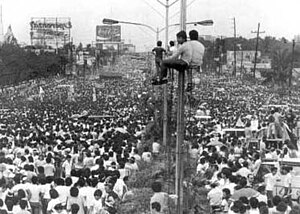EDSA People Power Revolution
| People Power Revolution | |||
|---|---|---|---|
 |
|||
| Date | 22 February 1986 – 25 February 1986 (3 days) |
||
| Location | Philippines, primarily Epifanio de los Santos Avenue, Metro Manila | ||
| Caused by |
|
||
| Goals | Removal of Ferdinand Marcos from office to put Corazon Aquino as the President |
||
| Resulted in |
Revolutionary victory
|
||
| Parties to the civil conflict | |||
|
|||
| Lead figures | |||
|
|
|||
| Number | |||
|
|||
Revolutionary victory
![]() People Power Revolutionaries
People Power Revolutionaries
Political groups:
Military defectors:
Others:
Religious groups:
Militant groups:
Government Parties:
The People Power Revolution (also known as the EDSA Revolution and the Philippine Revolution of 1986) was a series of popular demonstrations in the Philippines that began in 1983 and culminated on February 22–25, 1986. There was a sustained campaign of civil resistance against regime violence and electoral fraud. The nonviolent revolution led to the departure of President Ferdinand Marcos and the restoration of democracy in the Philippines.
It is also referred to as the Yellow Revolution due to the presence of yellow ribbons during the demonstrations following the assassination of Filipino senator Benigno "Ninoy" Aquino, Jr. It was widely seen as a victory of the people against the 20-year running authoritarian, repressive regime of then president Ferdinand Marcos, and made news headlines as "the revolution that surprised the world".
...
Wikipedia
